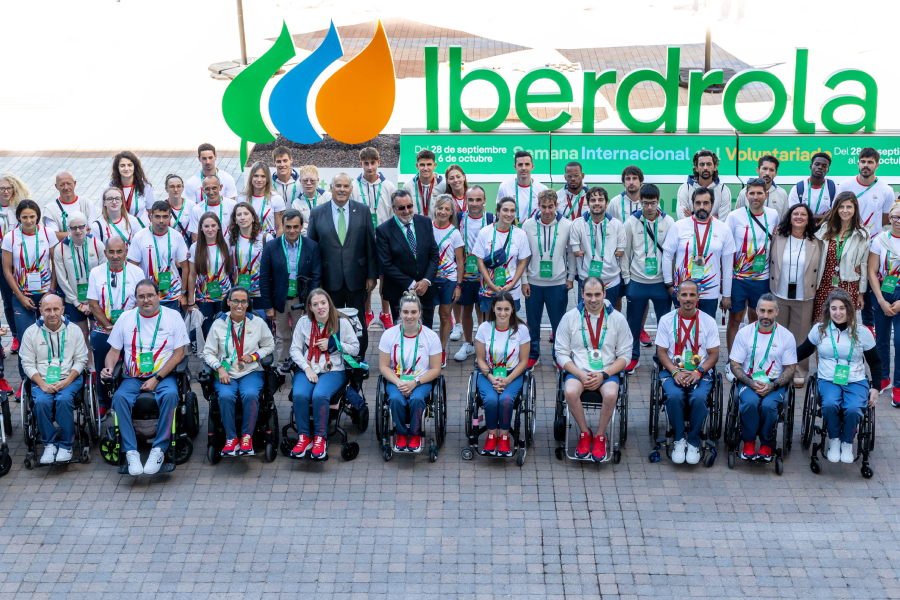The CEO of Iberdrola España welcomes the Spanish Paralympic team and celebrates their success in Paris
- In Spain, the electricity company has been working with the Paralympic Target Sport Support Plan (ADOP) since its creation in 2005 to provide Spanish Paralympic athletes with the best conditions to train and successfully participate in all the competitions.
- Adiaratou Iglesias, Desirée Villa, Eva Del Moral, Susana Rodríguez, Marta Fernández and Loida Zabala are some of the Paralympic sportswomen selected by the company to give visibility to the more than 800,000 federated sportswomen who make up the 35 federations it supports.

Iberdrola España reaffirmed its commitment to Spanish Paralympic sport and highlighted the achievements of our athletes in Paris with a reception for around 50 athletes held today at the company's offices in Madrid. The event was attended by the CEO of Iberdrola España, Mario Ruiz-Tagle, who, accompanied by several of the company's employees, welcomed the delegation, led by the President of the Spanish Paralympic Committee (CPE), Miguel Carballeda.
"As part of our commitment to equal opportunities, at Iberdrola España we do our part to ensure that you have the best conditions for your technical training and can aspire to overcome greater and greater challenges every day. Throughout this time with every training session and in every competition you have conveyed to us your enthusiasm, your generosity and your desire to excel. Thank you so much for making us believe and demonstrating that dreams, with hard work and dedication, can come true", said Mario Ruiz-Tagle.
Miguel Carballeda said, "The Paris Games, as well as a success, were a coming together with other people, after the hard times of the pandemic, in a city that was full of people and with competitions in emblematic places such as the Eiffel Tower, the Grand Palais, Les Invalides and the River Seine itself. The public was enthusiastic and filled the venues, creating an atmosphere of admiration for the Paralympic movement, and all of this through the lens of sustainability and accessibility for all. And this was all possible thanks to the unconditional support, dedication and affection of our travelling companions: Iberdrola España, which works alongside us with conviction to build a better and fairer world for all. We share values and we share the same path, and this was once again demonstrated in Paris".
In the French capital, the Spanish Paralympic team won 40 medals, surpassing the wins at Rio 2016 and Tokyo 2020. Our athletes’ performance in the games is an amazing accomplishment that Iberdrola España celebrates as part of its commitment to promoting equality through sport. Since 2016, the electricity company has been the main promoter of women's sport globally.
Nearly two decades supporting Paralympic sport
Iberdrola España has been collaborating in Spain with the Paralympic Sports Support Plan (ADOP) since its creation in 2005 to provide Spanish Paralympic athletes with the very best conditions to train and successfully participate in all competitions.
This initiative of the Spanish Paralympic Committee, the High Council on Sport (CSD) and the Ministry of Social Rights and Agenda 2030 is possible thanks to the financial backing of companies such as Iberdrola, which is committed to paralympic sport as a way of transmitting to society the values of hard work, self-improvement and teamwork that these athletes represent.
The company also has its Iberdrola Ambassadors programme, with which it aims to give visibility to the more than 800,000 federated sportswomen who make up the 35 federations it supports. There is a wide representation of female paralympic athletes, such as Adiaratou Iglesias, Desirée Villa, Eva Del Moral, Susana Rodríguez, Marta Fernández and Loida Zabala.
Iberdrola España, through its Foundation in Spain and with the CPE, offers paralympic athletes who are beneficiaries of the ADOP Plan scholarships for their under- and postgraduate education. This collaboration agreement aims to facilitate the professional training of athletes with a view to their joining the labour market in the future once their career in sports is over.
